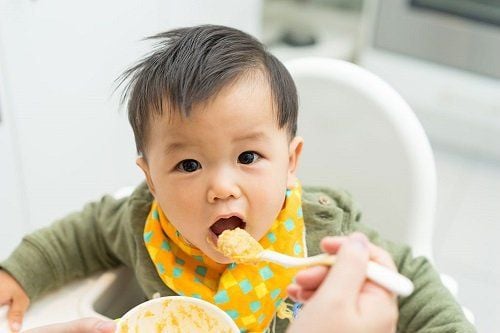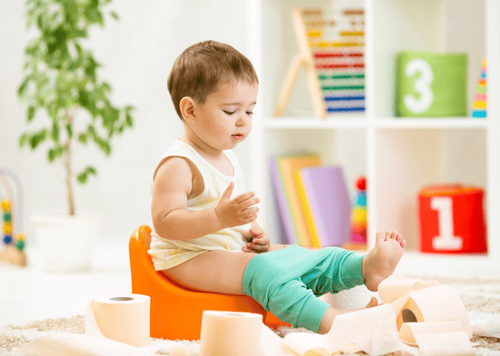This is an automatically translated article.
The article is professionally consulted by Master, Doctor Phan Ngoc Hai - Department of Pediatrics - Neonatology - Vinmec Da Nang International General Hospital
Children usually grow up in a natural sequence, although each child grows and acquires skills at his or her own pace, by 18 months of age, certain milestones should be reached . Parents need to know the developmental milestones they need to reach in order to monitor and care for their 18-month-old baby comprehensively across all areas.
1. Milestones of physical and motor development in 18-month-old children
These milestones are the physical development, motor skills and general muscular ability that babies need to achieve during the second year of development :
Weight and height: According to the World Health Organization , the average weight of an 18-month-old child is 10.5kg for girls and 11kg for boys. The average height of 18-month-old children is 80.8cm for girls and 82.3cm for boys. Walking alone without assistance: The child will let go of an adult's hand, not needing assistance but still able to walk alone correctly. To do so, children must achieve a certain development in muscles as well as keep a good body balance. Pulling toys while walking: 18-month-olds can not only walk on their own, but they can also pull a stringed toy behind, such as a toy car, while walking, or push an object forward while walking. Can crawl and go up stairs step by step with support: Some 18-month-old babies are just starting to walk but are able to crawl and go up stairs step by step with support. Without help, children still manage to climb up in short bursts and at a slower pace. When going down stairs, children can also walk on their own using the support of the handrail. The stronger the calf muscles, the more likely it will be to achieve this milestone. Play with the ball: Although the aim may not be accurate, children can learn to throw the ball forward. The biceps and the strength of the shoulders will help your child do this early on. Undressing: An 18-month-old is already able to dress or undress himself without adult assistance. Know how to drink from a cup and eat with a spoon: 18-month-old babies can use a cup or bottle to drink, know how to open the lid if there is a lid. Moreover, the child can also hold a spoon properly and put food in his mouth correctly. Teething with at least ten baby teeth: Ten baby teeth include 4 lower and upper middle incisors, 4 lower and upper incisors and 2 first lower molars. Some babies may even have extra upper molars by the time they reach 18 months, so the total number of teeth will be 12.

2. Cognitive development milestones in 18-month-old children
The following are important milestones in cognitive ability, brain development and thinking ability of an 18-month-old baby.
Remember the purpose of using some items: At this stage, children have understood the functions of some common household items. For example, children learn that a phone is for talking. When you give your child a spoon while eating, he will learn that it is used to scoop his own food. Matching objects: Children have recognized that identical objects will be put together, for example, children know how to choose shoes and socks in pairs. Knows to follow commands: When asked to "sit down" or "stand up," your baby will learn to sit down or get up. If the child is not yet cooperative and guided, he or she will learn how to do the same thing over and over again. Know the names of objects or body parts: When asked to point to the nose, mouth, hands, feet, etc., the child will correctly point to the body parts. If taught and practiced daily, children's vocabulary will develop very quickly during this period. Can imitate complex actions: An 18-month-old will imitate picking up vegetables if they see their mother cooking or pretending to shave when they see their father shave. Babies already know how to observe in detail the actions of adults and imitate them often throughout the day. Point to what the child wants: If a child wants an adult to take his toy from the shelf, he already knows how to point at the toy. Furthermore, children also learn that pointing at something shows a clear interest and asking for help. Know how to draw first scribbles with a pencil: The first scribbles on paper in an 18-month-old baby show that they are proving they know how to use the pencil correctly when presented with a pencil. Although children are not yet able to create meaningful drawings, doodles are created quite enthusiastically and actively on paper, even the floor and walls. Role play: Children already know how to show interest in toys and pretend play. Children pick up a stuffed animal, doll and know how to stroke it carefully or pretend to talk to it, feed it. This form of pretend play allows children to develop imaginative abilities later in life.
Trắc nghiệm: Sự phát triển tinh thần, vận động của bé thế nào là đúng chuẩn?
Khi nào bé biết nói, biết hóng chuyện hay biết cầm cốc là "đúng chuẩn"? Điểm xem bạn biết được bao nhiêu mốc phát triển tinh thần, vận động "đúng chuẩn" của bé nhé!The following content is prepared under supervision of Thạc sĩ, Bác sĩ y khoa, Ma Văn Thấm , Nhi , Phòng khám Đa khoa Quốc tế Vinmec Dương Đông(Phú Quốc)
3. Social and emotional development milestones in 18-month-old children
The following are milestones in social, temperament, emotional and language skills in 18-month-olds :
Knowing how to respond to greetings: Initially, upon receiving a Some greetings from parents or caregivers, the child may be silent, not responding. At 18 months old, babies can not only respond, but also know how to greet people enthusiastically. Know how to laugh when necessary: Children already know how to laugh to show pleasure or to respond to the laughter of the opposite person. Babies have even realized that smiling can be necessary for social bonding and 18-month-olds will practice smiling regularly. Know how to express negative emotions according to purpose: When they are not properly cared for or pampered, children know how to pretend to cry or get angry until they reach their goal. Therefore, parents or caregivers need to teach children in a loving and tough way right from this stage. Anxiety with strangers: When around new faces appear, children will appear a little nervous and wary of their presence. If strangers try to come near or touch, your baby may start to cry. Clinging to Parents in New Situations: 18-month-olds will cling to their parents when they arrive at a new place, when they are unfamiliar with their surroundings, or when they are unsure of what is going on. This is most evident on the first day of school. Show affection to familiar people: Those close to your baby will be rewarded with hugs and adorable smiles from them. An 18-month-old will show affection enthusiastically, especially towards primary caregivers, parents, and siblings. Play social games: Your 18-month-old will have a great time playing, running, and jumping with loved ones like siblings and peers Can speak some simple words: Your baby already has a vocabulary with about 10-20 simple words that help convey their feelings or thoughts. Some other pronunciations are meaningless, but children already know how to say them and use them to ask adults for help with something. Shaking and nodding: Children already know how to turn their heads from side to side to show "no". Similarly, children know how to nod to show "yes".

In a nutshell, every baby is unique and may develop at different rates than their peers. However, the milestones above represent what your baby needs to achieve by the time he turns 18 months old. As a result, if an 18-month-old child cannot speak, walk or do simple things, parents need to take the child to a doctor soon, find the cause of the child's growth retardation, and promptly correct it.
18-month-old children need 5mg of elemental zinc/day to eat well, reach the correct height and weight and exceed the standard. Zinc plays a role in affecting most biological processes taking place in the body, especially the breakdown of nucleic acids, proteins... Organs in the body when zinc deficiency can lead to a There are a number of diseases such as neurological disorders, irritability, etc. Therefore, parents need to learn about the role of zinc and guide them to appropriate zinc supplements for their children.
In addition to zinc, parents also need to supplement their children with other important vitamins and minerals such as lysine, chromium, B vitamins,... errands.
Please regularly visit Vinmec.com website and update useful information to take care of your baby and family.















